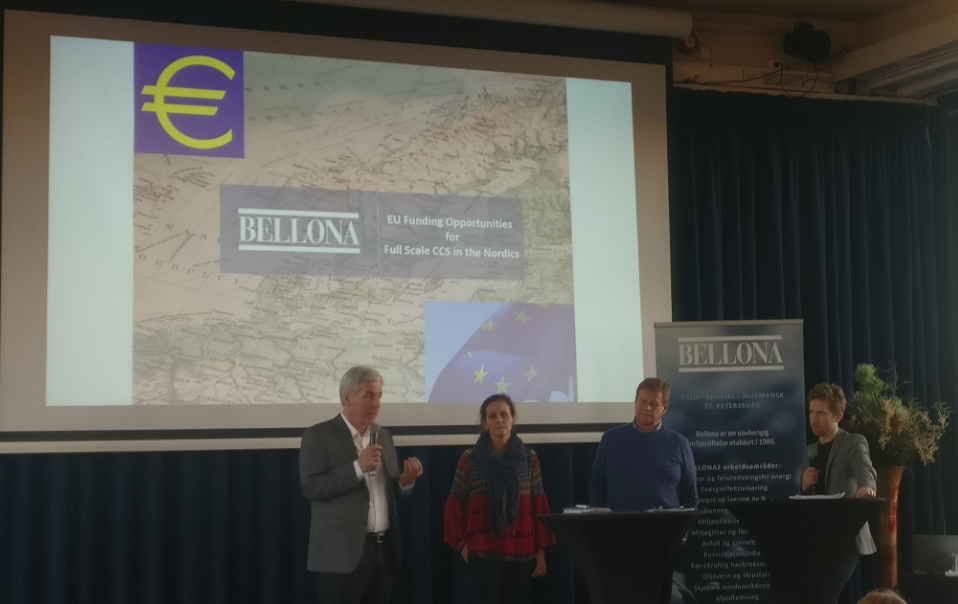
Court decision puts Norway on the hook for massive CO₂ Storage build-out
A ruling by the European Free Trade Association Court that Norway’s continental shelf falls under the European Economic Area Agreement could dramatic...
News

Publish date: December 5, 2018
News
On the 22nd of November, Bellona organised a Breakfast Seminar, in Oslo (Norway), where representatives from the Norwegian government, the European Commission and industry discussed CCS in Scandinavia and the potential for European funding.
Secretary of State for Petroleum and Energy, Ingvil Smines Tybring- Gjedde, elaborated on the importance and willingness of the Norwegian government to establish key demonstration projects for CCS in Norway, which can lead the way for further projects. For this to happen cost-effectively and reach full scale, she emphasised the importance of international collaboration and developing a pipeline of follow-on capture projects, including in other European countries.
 Credit: Bellona
Credit: Bellona
Norway has major potential to become a major new CCS Infrastructure Hub in the North Sea, offering a mitigation solution for a multitude of European countries, and potentially bringing down the cost (and, importantly, risk) of CCS projects significantly. The project also offers opportunities to the EU under the forthcoming ETS Innovation Fund; with Norway developing CCS infrastructure, the EU Innovation Fund could then support investment in capture facilities across Europe, creating synergies with the EU Horizon Programme and the Connecting Europe Facility, which can support investment in CO2 transport by ship or pipeline.
Christian Holzleitner, who leads the European Commission’s work on Land Use and Finance for Innovation in the Directorate-General for Climate Action, then offered attendees an insight into the detailed design of the Innovation Fund, which is currently being discussed by the Innovation Fund Expert Group. The Innovation Fund is set to offer project proponents significantly more flexibility, including by recognising the value of commercial innovation and new business models, offering up to 40% of funding independent of verified avoided emissions, and introducing a new potential for pre-financing (e.g. by funding FEED or feasibility studies). Whilst emphasising that calls will be open to all eligible projects, sectors and technologies, Christian suggested that the Innovation Fund will also be open to so-called ‘part chain’ CCS projects, either those developing infrastructure or those developing capture projects. This could make a major contribution to de-risking the CCS chain and enabling investments.
Petter Holland from refining company, Preem, Jannicke Gerner Bjerkås from Fortum Oslo Varme, and Per Brevik from Norcem, then spoke about the potential of CCS to tackle industrial emissions. All three emphasised the need for immediate action and their support for CCS. Therefore, there is a need to build strong business cases, political support, and legal frameworks both at the European and national levels, to facilitate investments for CCS in industries. Once this is done, scaling of CCS projects and other technologies to combat climate change will be a lot more feasible and efficient.
 Credit: Bellona
Credit: Bellona
Bellona continues to provide support to the Commission on the design of the Innovation Fund as one of 5 NGO representatives on the Innovation Fund Expert Group. For further information, please contact: europe@bellona.org

A ruling by the European Free Trade Association Court that Norway’s continental shelf falls under the European Economic Area Agreement could dramatic...

Bellona held a seminar on countering Russian disinformation in the Arctic at the Arctic Frontiers international conference in Norway

Our December Nuclear Digest, reported by Bellona’s Environmental Transparency Center, is out now. Here’s a quick taste of three nuclear issues arisin...

Bellona has launched the Oslofjord Kelp Park, a pilot kelp cultivation facility outside Slemmestad, about 30 kilometers southwest of Oslo, aimed at r...